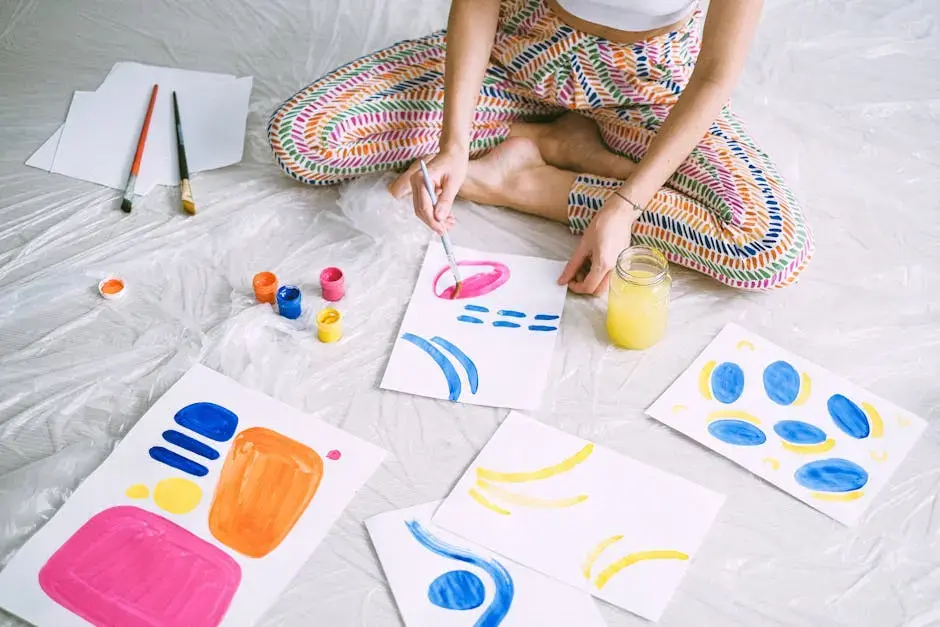10 Creative Therapy Activities That Can Transform Your Life
- Karrie Stafford

- Jul 17, 2024
- 6 min read
Are you ready to explore the power of creativity in therapy? These 10 creative therapy activities have the potential to truly transform your life. From painting to dance, each activity offers a unique way to express emotions, foster healing, and boost overall well-being. Let's dive into the world of creative therapy and discover the incredible benefits it can bring to your mental and emotional health.

1. Unleash Your Creativity Through Painting Sessions
Painting is not just about putting brush to canvas; it's a powerful form of self-expression. Through colors and strokes, you can convey emotions, process trauma, and explore your inner world in a non-verbal way. Art therapy sessions provide a safe space to unleash your creativity, allowing you to communicate feelings that words may fail to express.
The act of painting itself can be therapeutic, promoting relaxation and mindfulness. As you immerse yourself in the creative process, worries fade away, and you enter a state of flow where time seems to stand still. Whether you're a seasoned artist or a beginner, painting therapy can be a transformative journey of self-discovery and healing.
Engaging in painting sessions can also help you gain insights into your emotions and thought patterns. The colors you choose, the shapes you create—all reflect aspects of your psyche. By observing your artwork, you can uncover hidden meanings, resolve inner conflicts, and embark on a path of personal growth and understanding.
2. Embrace Mindfulness with Meditation and Breathing Exercises
Mindfulness is a powerful tool for managing stress, anxiety, and emotional turmoil. By incorporating meditation and deep breathing exercises into your daily routine, you can cultivate a sense of inner peace and clarity. Mindful breathing connects you to the present moment, grounding you in a state of calm awareness.
Through mindfulness practices, you learn to observe your thoughts without judgment, fostering a compassionate and non-reactive mindset. By enhancing your ability to stay present and focused, you build resilience against life's challenges and improve your overall emotional well-being. Embrace mindfulness as a pathway to self-awareness and inner tranquility.
Incorporating mindfulness into your daily life can have profound effects on your mental health and quality of life. By cultivating a mindful approach to stress, emotions, and relationships, you pave the way for greater self-acceptance, clarity, and emotional balance. Through meditation and breathing exercises, you can embark on a journey of self-discovery and inner transformation.
3. Explore Self-Expression in Music Therapy Sessions
Music has the power to touch the deepest parts of our soul, evoking emotions and memories in ways words cannot. In music therapy sessions, you have the opportunity to explore self-expression through sounds, rhythms, and lyrics. Whether through listening, singing, or playing instruments, music therapy offers a unique channel for processing emotions and fostering connection.
Engaging in music therapy can help you release pent-up feelings, increase self-awareness, and improve communication skills. The therapeutic use of music can be empowering, uplifting, and transformative, providing a safe outlet for emotional expression and exploration. Through music, you can tap into your innermost thoughts and feelings, leading to profound personal insights and growth.
Music therapy is not just about creating melodies or harmonies; it's about connecting with yourself on a deep emotional level. The rhythms, tones, and lyrics you resonate with can reveal aspects of your inner world, guiding you on a journey of self-discovery and healing. With each music therapy session, you have the opportunity to delve into the healing power of sound and rhythm.
The use of music in therapy can be a transformative experience, offering a source of comfort, inspiration, and catharsis. Whether you're exploring your favorite songs, creating new melodies, or simply listening with intent, music therapy sessions can enrich your emotional well-being and enhance your overall quality of life.
4. Find Inner Peace Through Guided Imagery Techniques
Guided imagery techniques offer a doorway to your subconscious mind, allowing you to explore deep-seated emotions and beliefs. In therapy sessions, you're guided through vivid visualizations that evoke relaxation, healing, and self-discovery. By immersing yourself in the power of imagination, you can access inner resources and uncover hidden truths.
The practice of guided imagery can help you reduce stress, anxiety, and emotional distress by creating a sense of inner peace and tranquility. As you visualize calming scenes and positive outcomes, your mind and body respond by relaxing and releasing tension. Guided imagery techniques offer a gentle yet powerful way to tap into your inner wisdom and cultivate resilience.
Through guided imagery, you can reframe negative thought patterns, overcome limiting beliefs, and envision a future filled with hope and possibility. By engaging in visualization exercises, you can shift your perspective, enhance self-confidence, and foster a profound sense of inner peace and well-being. Embrace the transformative power of guided imagery in your therapeutic journey.
5. Heal Emotional Wounds with Journaling and Writing Therapy
Writing is a cathartic and transformative process that allows you to externalize thoughts and emotions. Journaling and writing therapy provide a creative outlet for expressing your deepest feelings, fears, and desires. By putting pen to paper, you can release emotional burdens, gain clarity, and embark on a journey of self-exploration and healing.
The act of journaling can help you make sense of complex emotions, unravel past traumas, and identify patterns in your thoughts and behaviors. Through writing therapy, you can gain insight into your inner world, process unresolved issues, and cultivate a greater sense of self-awareness and acceptance. Writing can be a powerful tool for self-reflection and personal growth.
6. Cultivate Joy with Dance Movement Therapy Sessions
Dance is a universal language of expression, joy, and connection. In dance movement therapy sessions, you have the opportunity to move your body, release pent-up energy, and express emotions through movement. Whether through improvisation, structured choreography, or guided exploration, dance therapy offers a vibrant and dynamic way to connect with yourself and others.
Engaging in dance movement therapy can help you access and express suppressed emotions, increase body awareness, and improve emotional regulation. The physical movement and expression of dance can be liberating, empowering you to release tension, reduce stress, and enhance your overall well-being. Through dance, you can tap into the healing power of movement and self-expression.
7. Enhance Communication Skills Through Drama Therapy Activities
Drama therapy is a unique approach that uses the power of storytelling and role-playing to explore emotions, relationships, and personal narratives. Through drama activities, you can step into different roles, perspectives, and scenarios, gaining insight into your own behavior and communication patterns. Drama therapy sessions foster creativity, empathy, and self-discovery.
Engaging in drama therapy activities can help you develop effective communication skills, enhance emotional intelligence, and practice new ways of relating to others. By embodying different characters and situations, you expand your capacity for empathy, understanding, and self-expression. Drama therapy offers a playful and transformative space for exploring emotions and building connections.
8. Boost Confidence with Art and Sculpture Therapy Sessions
Art and sculpture therapy provide a hands-on approach to self-expression, creativity, and personal growth. By working with various art mediums and sculpting materials, you can tap into your inner artist and explore new forms of expression. Whether you're sketching, painting, or shaping clay, art therapy sessions offer a safe and supportive space to boost confidence and unleash your creativity.
The process of creating art and sculptures can be empowering, helping you build self-esteem, overcome self-doubt, and celebrate your unique talents. Through artistic expression, you can gain a deeper understanding of yourself, your strengths, and your inner beauty. Art therapy sessions encourage experimentation, playfulness, and self-discovery, fostering a sense of empowerment and self-worth.
9. Achieve Mental Clarity with Nature-Based Therapy Techniques
Nature has a profound impact on our mental and emotional well-being, offering a sense of peace, connection, and clarity. Nature-based therapy techniques encourage you to immerse yourself in the natural world, whether through outdoor walks, ecotherapy, or gardening. By reconnecting with nature, you can reduce stress, increase mindfulness, and gain perspective on life's challenges.
Engaging in nature-based therapy allows you to slow down, breathe deeply, and appreciate the beauty of the world around you. By tuning into the rhythms of nature, you can find harmony, balance, and mental clarity. Nature-based activities offer a holistic approach to healing, promoting emotional resilience, mental well-being, and a deeper connection to the natural world.
10. Build Resilience Through Play and Sand Tray Therapy
Play is not just for children; it's a powerful tool for self-expression, exploration, and healing. In sand tray therapy, you have the opportunity to engage in symbolic play, using miniature figures and sand to create scenes and narratives. Through play therapy, you can explore subconscious thoughts, process emotions, and uncover hidden aspects of your psyche.
The act of playful exploration and creation can help you build resilience, cope with stress, and develop problem-solving skills. By engaging in sand tray therapy activities, you can externalize internal conflicts, experiment with new perspectives, and find solutions to complex challenges. Play therapy offers a lighthearted and transformative space for self-discovery and growth.




Comments